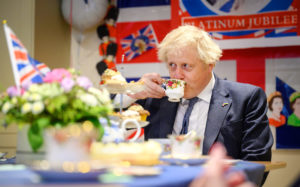Headlines scream about a looming “class war“; reports warn of an inevitable “summer of discontent”. Britain’s newspapers are trying their hardest to evoke the chaos of the winter of 1978-79, which, in the neoliberal fairy-tale version of history, marked the grim nadir of union power and social collapse in the UK. As with all fairy-tales, it also had a happy ending, in this case with Britain’s exhausted voters ejecting James Callaghan’s Labour government and sweeping Mrs Thatcher into office to save the country from intransigent union barons and far-Left militancy.
Yet on almost every level, the notion that we’re seeing a return to the Seventies is fantasy politics. Certainly, by paralysing Britain’s rail transportation network through the withdrawal of their members’ labour, the RMT has demonstrated the latent industrial power of Britain’s workers. But just as one swallow does not make a summer, so three days of national strikes by a single union does not signal a return to 1979, let alone a future blighted by class war. Union membership and labour militancy remain at historic lows across the Western world, including in Britain.
Yes, Britain’s summer of chaos is real enough: energy prices, NHS waiting lists, flight cancellations, and inflation are all spiralling. But none of these ills can be attributed to union power or working-class tumult.
It is not uppity labourers but supply chain shocks stemming from the pandemic and lockdown, as well as the Ukraine war, that are driving inflation, smoothed along by pre-emptive corporate price hikes. It is not union barons but airline companies, which slashed so many jobs during the lockdown, that have shredded Britons’ summer plans. And unlike in the Seventies, today’s economic sclerosis can hardly be blamed on creaking nationalised behemoths, given the fact that the Tories have sold off most of them over the last 40 years.
Under an exhausted Tory government, corporate profits are booming while wages are being eaten up by inflation. We are at the end of the process that began with Thatcher’s election in 1979. In short, however this tale unfolds, it will necessarily have a different ending; a neoliberal fairy godmother isn’t going to come to the rescue.
Back in Seventies, governments had no choice but to negotiate with pervasive and powerful unions. Then Thatcher came along and pursued a different tack of open confrontation in her bid to break up the power of the organised working class. Today, the Conservative government’s refusal to negotiate with the RMT is no flash of Thatcherite steel, but a sign that they are unwilling to take political responsibility for Britain’s railway grid, which they have already been nationalising through a haphazard, piecemeal process driven by necessity over the last few years. The Tories’ unwillingness to fully reverse the failed disaster of rail privatisation betokens no commitment to free market nostrums, but a simple inability to see anything through at all.
This is not just a process of elite decay but also a direct result of neoliberal government inaugurated by Thatcher: the regulatory state that replaced the command-and-control state had less direct power. And with less direct power at stake in party-political competition, politics itself became less meaningful, with the banks and corporations sucking up the best and brightest that would have once formed the cadre of government and party-political elite. Neoliberalism locked in a vicious cycle in which a diminished public life drew in increasingly mediocre professional politicians, culminating in our hapless parliamentary class of today. Taking back control of Britain’s railways would require a political vision, and that is something our politicians are unable to supply.
All of this indicates that we are not returning to the Seventies, and we are far away from class war. The fact that sub-editors and journalists have no way to frame the railway dispute except by plucking out shibboleths about seasons of discontents only shows that the Right and the Tory middle classes need socialism and class war just as much as the Left needs fascism — which is to say they have no vision to offer. It is ultimately unsurprising that a generation of journalists, editors and pundits whose careers were made in the era of neoliberalism are struggling to adapt; after all, what we are going through is the end of an exhausted neoliberalism.
The exception to this fantasy politics is the RMT itself, which is seeking to defend its members’ wages and jobs. How far this will inaugurate a new confidence in labour organisation and trade unionism remains to be seen. It certainly seems that, with attempts to re-shore various industries and supply chains, and with tightening labour markets, the conditions exist for some form of organised labour to re-emerge from the abyss. Add to that the way Covid lockdowns exposed our collective dependence on a swathe of often poorly paid and menial working-class jobs, and it is hardly surprising that in the aftermath, “key workers” are now claiming more than merely symbolic tokens of our affirmation.
But who will support them? The fact the broad swathes of the middle-class Left has thus far shown sympathy for a working-class strike is probably more reflective of the Left’s penchant for working from home in the wake of the pandemic than any substantive political solidarity. Were the RMT threatening the middle classes’ capacity for telecommuting, we can be certain we would already have been subjected to a torrent of op-eds and tweets about the “privileges”, racial exclusivity and backwards sexual mores of RMT members. Intersectionalism is designed to disable the formation of collective interests, majoritarian decision-making and solidarity. As long as the Left remains committed to intersectionalism, it will have nothing to offer the reformation of independent working-class politics in Britain. This is plain in Labour leader Keir Starmer’s efforts to distance himself from the industrial action — an attempt to maintain the strategy of triangulation and middle-class support.
Throughout the neoliberal era, it is the unions that were cast in the role of conservative goliaths, standing in the way of the forces of technology, modernisation and globalisation. If it were ever true, that narrative certainly no longer holds: from its insurgent beginnings in the Seventies, British neoliberalism has collapsed into widening inequalities, technocracy, lockdown, indebtedness, stagnant wages and wilting productivity. Can a new working-class politics reverse these trends? For all the media histrionics provoked by the RMT strike, one thing it has exposed is that our entire social and political order rests on labour passivity and working-class quiescence. What happens when this ends?
Disclaimer
Some of the posts we share are controversial and we do not necessarily agree with them in the whole extend. Sometimes we agree with the content or part of it but we do not agree with the narration or language. Nevertheless we find them somehow interesting, valuable and/or informative or we share them, because we strongly believe in freedom of speech, free press and journalism. We strongly encourage you to have a critical approach to all the content, do your own research and analysis to build your own opinion.
We would be glad to have your feedback.
Source: UnHerd Read the original article here: https://unherd.com




